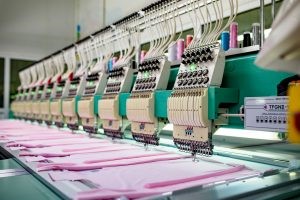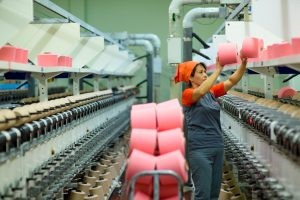
Traditionally known as one of the leading cotton exporters, Uzbekistan has long been more than a supplier of raw materials: in total, there are around 7,500 textile and clothing companies of various sizes.
For years, the Central Asian country was considered unreliable with regard to environmental and social standards. Above all, the accusation of child labour scared off international buyers. However, the ILO now certifies that the Uzbeks have a pleasingly high level of labour standards. Uzbekistan today produces a wide range of goods, from yarns to finished goods. 825 companies produce textiles and 6750 – sewing and knitwear. More than 950 companies export their goods. Investors come from China, South Korea, Russia, India, Singapore, Germany, Switzerland and other countries.

“There is great potential for cooperation between the German and Uzbek textile and clothing industries. Uzbekistan has a fully integrated textile chain and state-of-the-art production facilities. Today, the country attaches great importance to social and environmental standards.”
Prof. Dr. Klaus Mangold, Mangold Consulting
Photo: © Wolfgang List
The industry currently accounts for over 16 percent of Uzbek’s industrial production. President Mirziyoyev is vigorously pushing ahead with economic opening and recognizing the comparative advantages of the industry. Its decision “On urgent measures to support the textile, sewing and knitting industry” provides for far-reaching investment projects over the next five years, which are to be primarily aimed at exports.
Export: Added value instead of raw materials
 By 2025, Uzbekistan wants to completely abandon the export of raw cotton through one hundred percent domestic processing. According to Uztextilprom, the Uzbek textile association, this is expected to increase industry exports to 7.1 billion US dollars – compared to 2.2 billion US dollars (including cotton fibres) in 2019. Last year, exports (excluding cotton fibers) increased by a remarkable 25.3 percent to more than $1.6 billion. The main customers were Russia, China and Turkey.
By 2025, Uzbekistan wants to completely abandon the export of raw cotton through one hundred percent domestic processing. According to Uztextilprom, the Uzbek textile association, this is expected to increase industry exports to 7.1 billion US dollars – compared to 2.2 billion US dollars (including cotton fibres) in 2019. Last year, exports (excluding cotton fibers) increased by a remarkable 25.3 percent to more than $1.6 billion. The main customers were Russia, China and Turkey.
Working conditions greatly improved
For many years it was customary in Uzbekistan to employ pupils, students and teachers as “voluntary” harvest helpers. Probably very few came of their own free will. Since 2016, the total number of forced pickers on Uzbek cotton fields has fallen sharply. Child labour in the disappeared. The wages of cotton pickers have almost doubled since 2017 and today amount to about 0.07 to 0.12 euros per 1 kg of cotton. The International Labour Organization (ILO) explicitly underlines the enormous improvements in its latest report “Third-party monitoring of child labour and forced labour during the 2019 cotton harvest in Uzbekistan” (published Feb. 2020).
“The ILO continues to find that systematic or systemic child labour is no longer used during the cotton harvest in Uzbekistan. Systematic forced labour did not occur during the 2019 harvest.”
ILO report on child and forced labour in the 2019 cotton harvest in Uzbekistan
 Above all, organizations in the cotton country USA such as the “Cotton Campaign” ignore the progress in Uzbekistan and call for a boycott of Uzbek cotton on the basis of outdated reports. A rogue who thinks evil. The “Cotton Pledge” has been signed by a total of 305 manufacturers and distributors, including some major international players. In Europe, on the other hand, customers have already spread to the improvements. The Gesellschaft für Internationale Zusammenarbeit (GIZ) is also working with the local industry on a large-scale programme for sustainable cotton production and processing. Soon, Uzbekistan should be able to offer certified products in considerable quantities.
Above all, organizations in the cotton country USA such as the “Cotton Campaign” ignore the progress in Uzbekistan and call for a boycott of Uzbek cotton on the basis of outdated reports. A rogue who thinks evil. The “Cotton Pledge” has been signed by a total of 305 manufacturers and distributors, including some major international players. In Europe, on the other hand, customers have already spread to the improvements. The Gesellschaft für Internationale Zusammenarbeit (GIZ) is also working with the local industry on a large-scale programme for sustainable cotton production and processing. Soon, Uzbekistan should be able to offer certified products in considerable quantities.
UZTEXTILPROM
Der usbekische Textil- und Bekleidungsverband Uztextilprom vertritt rund 1.400 Industriebetriebe, darunter 130 Spinnereien, 114 Webereien, 54 Strumpfhersteller, 38 Wattehersteller, 26 Maschenstoffproduzenten und mehr als 1.000 Nähereien. Uztextilprom setzt sich dafür ein, dass die heimische Baumwolle vermehrt im Inland zu Halb- und Fertigprodukten verarbeitet wird. Die Pläne für die Jahre bis 2025 umfassen mehr 200 Vorhaben für 3 Mrd. US-Dollar. 2020 setzt der Verband rund 70 Projekte mit einem Gesamtwert von mehr als 860 Millionen US-Dollar um. Die Anzahl von Baumwoll-Textil-Clustern stieg 2019 auf 75 (2018: 15). Uztextilprom arbeitet mit zahlreichen internationalen Partnerorganisationen im Bereich Training und Zertifizierung zusammen. Gesamtmasche hat bereits 2010 eine Vereinbarung mit der Vorgängervereinigung geschlossen, die 2017 angepasst und erneuert wurde. Folgende Zertifizierungen wurden in der Branche bereits erreicht:
• ISO-9001 800+ Unternehmen
• Energy efficiency ISO-50001 10+ Unternehmen
• STANDARD 100 by OEKO-TEX® 35+ Unternehmen
• GOTS 1+ Unternehmen
• BSCI 15+ Unternehmen
• SEDEX 15+ Unternehmen
Fotos: © Uztex
Uzbek goods can now be imported into the EU duty-free. Only developing countries with high environmental and social standards qualify for the special preferences.